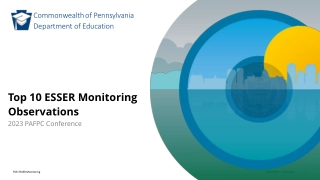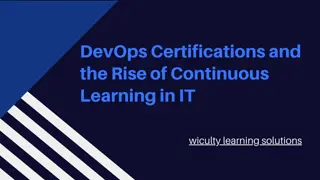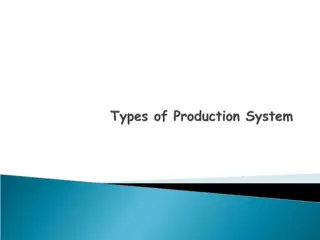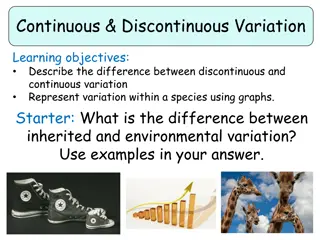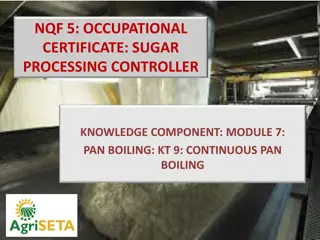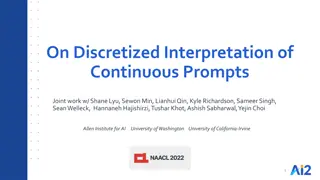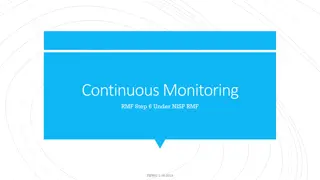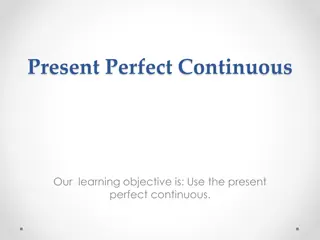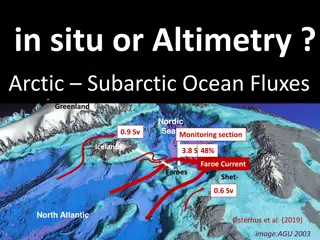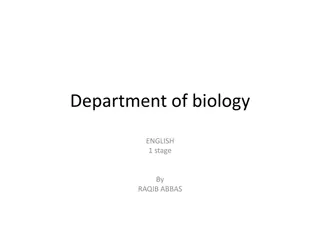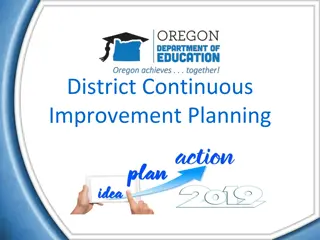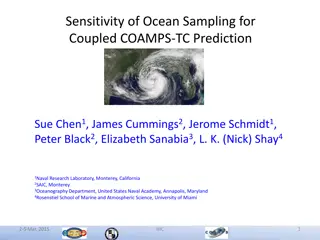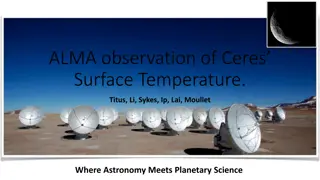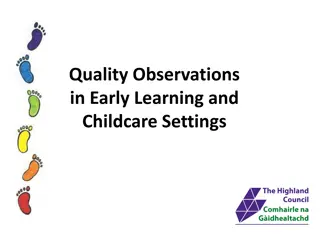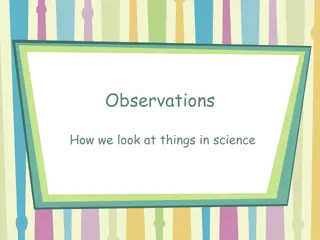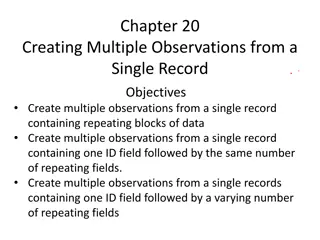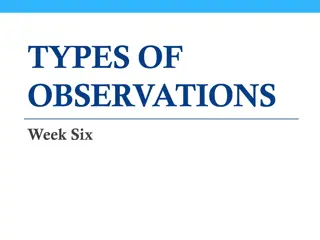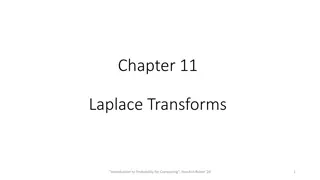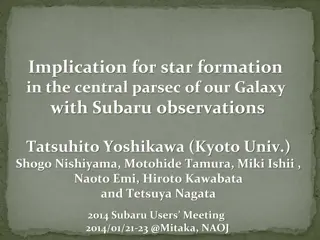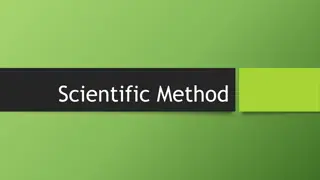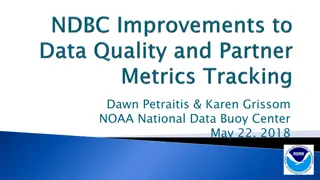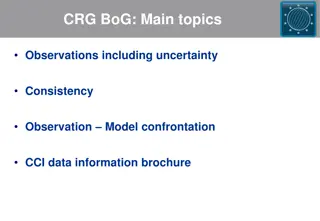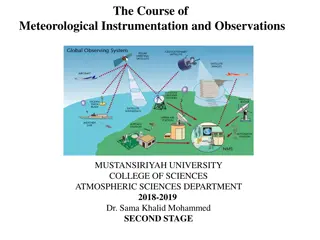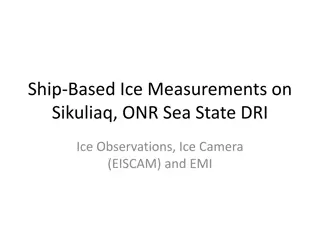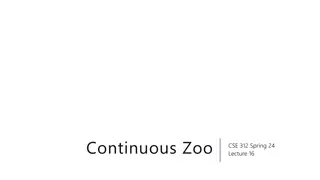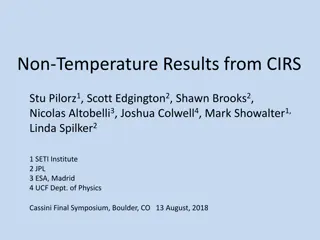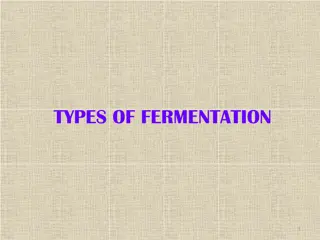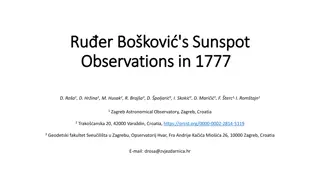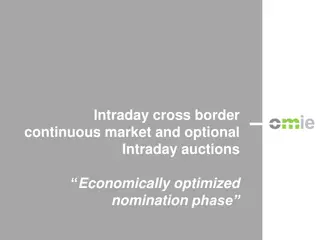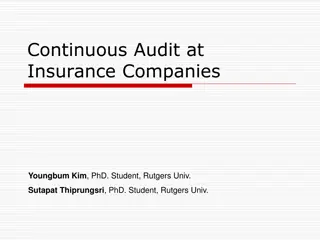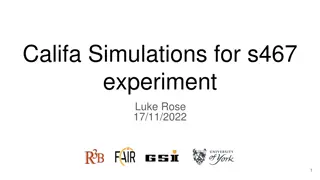Status of Activities Supporting the Space Weather Observations (SWO) Office
The status of activities supporting the Space Weather Observations (SWO) office, including implementation aspects and programs. It also emphasizes the importance of space weather information in various industry sectors and the need for planning follow-on missions for continued observations.
7 views • 26 slides
Understanding ESSER Monitoring Observations in Pennsylvania Education
Explore the top 10 ESSER monitoring observations from the Commonwealth of Pennsylvania Department of Education. Learn about the structure, content, facilitators, and key areas of review involved in assessing educational programs. Gain insight into how observations play a crucial role in ensuring com
1 views • 42 slides
Evaluation of SPLASH and HRRR Soil Moisture Comparison
This study compares soil moisture data between the HRRR model and SPLASH observations during the 2022 warm season. It explores differences in soil moisture levels at various depths, evaluates responses to precipitation events, and drydown periods. The research focuses on analyzed data from HRRR Mode
3 views • 12 slides
Learn Past Continuous Tense - Grade 6 English Lesson
This Grade 6 English lesson focuses on understanding and correctly using the past continuous tense. It covers the rules for forming the past continuous tense, examples of its usage, and an assessment to test comprehension. Students will practice talking about actions happening at specific times in t
4 views • 6 slides
Europe Continuous Bioprocessing Market
The Europe Continuous Bioprocessing Market is expected to grow at a CAGR of 19.1% from 2023 to 2030 to reach $206.1 million by 2030. Continuous manufacturing is an emerging trend spanning various industries. From automotive to paper, businesses are embracing continuous manufacturing to enhance effic
3 views • 2 slides
Learning Past Continuous Tense with Pronouns and Forming Questions
Explore how to use pronouns with "was" and "were" in the past continuous tense through examples and practice sentences. Learn to form questions using the past continuous tense and develop an understanding of when to use "was" or "were" with different subjects. Improve your grammar skills with this l
9 views • 15 slides
DevOps Certifications and the Rise of Continuous Learning in IT
The rise of DevOps certifications and the emphasis on continuous learning are reshaping the IT landscape. As organizations strive for greater efficiency and innovation, the demand for skilled DevOps professionals will continue to grow. By embracing continuous learning and obtaining relevant certific
0 views • 8 slides
Understanding Types of Production Systems: Intermittent vs. Continuous
Types of production systems are categorized into Intermittent Production System and Continuous Production System. In Intermittent Production, goods are produced based on customer orders in a flexible and non-continuous manner, allowing for a variety of products. Examples include goldsmiths making or
10 views • 17 slides
Understanding Continuous and Discontinuous Variation in Species
Explore the concepts of continuous and discontinuous variation within species, distinguishing between inherited and environmental factors. Engage in practical activities to represent variation graphically and categorize characteristics based on their variability. Promote interactive learning through
0 views • 15 slides
Understanding Continuous Pan Boiling in Sugar Processing
Continuous pan boiling is a key process in sugar production, involving multiple compartments where massecuite is heated and circulated. This method ensures efficient crystallization and control of brix levels for optimal sugar quality. The design, operation, and control of continuous pans play a vit
0 views • 11 slides
Exploring Discretized Interpretation of Continuous Prompts
Delve into the analysis of discrete text prompts and their interpretation of continuous prompts in AI research. The work explores sentiment analysis using pre-trained language models along with recent breakthroughs in spatial reasoning. Discover the challenges in interpreting and optimizing text pro
0 views • 21 slides
Understanding Continuous Monitoring in Risk Management Framework (RMF)
Explore the continuous monitoring process in the Risk Management Framework (RMF) under the NISP RMF FISWG. Learn about the six steps in the RMF process, DSS-provided RMF guidance, and an overview of RMF continuous monitoring strategies and security control families. Discover how to outline DSS RMF p
1 views • 25 slides
Understanding the Present Perfect Continuous Tense
Master the present perfect continuous tense with a guide on its formation, usage, and examples. Enhance your English skills by answering questions in the present continuous tense to demonstrate your understanding.
0 views • 4 slides
Understanding and Addressing Instability in Particle Accelerators
In this document, E. Shaposhnikova from CERN discusses observations and cures for instability in particle accelerators. The content covers types of instabilities, observations like direct and indirect effects, and possible cures such as modifying the source, passive and active damping, and changing
2 views • 30 slides
Monitoring Faroe Current Transport with Satellite Altimetry and In-situ Observations
Combining satellite altimetry and in-situ observations offers a comprehensive approach to monitoring volume, heat, and salt transports in the Faroe Current. The study focuses on the representativeness of ocean observations in the Arctic and Subarctic regions, highlighting the importance of combining
0 views • 11 slides
Understanding CI/CD and Deployment Strategies in Software Development
Continuous Integration (CI) involves frequent code integration, automated testing, and error detection. Continuous Delivery (CD) extends CI by packaging artifacts for end users, while Continuous Deployment automatically deploys software. Explore deployment strategies like Blue/Green, Canary, and A/B
1 views • 16 slides
Understanding Future Continuous Tense in English Grammar
Future Continuous Tense is used to describe ongoing actions or events in the future. It signifies that something will be happening continuously over a period of time ahead. Learn about forming sentences, asking questions, and using negatives in the Future Continuous Tense with examples. Enhance your
1 views • 4 slides
Oregon District Continuous Improvement Planning Process
Explore the key components of Oregon's district continuous improvement planning process, including objectives, executive memos, ODE commitments, and the essential elements that all Oregon districts must incorporate into their continuous improvement plans. Learn about the shifts in the overarching vi
0 views • 9 slides
Sensitivity of Ocean Sampling for Coupled COAMPS-TC Prediction Study
This study explores the optimal ocean sampling strategy for Hurricane Isaac (2012) using high-resolution in-situ observations. It investigates the sensitivity of tropical cyclone intensity change through assimilation of AXBT, AXCTD, and AXCP observations. Results show significant impact areas along
0 views • 12 slides
ALMA Observation of Ceres Surface Temperature
ALMA conducted ground-based observations of Ceres' surface temperature providing valuable insights for planetary science. The data processing steps involved models interpolation, radio calibration, and thermal gradient correction to produce thermal flux maps. Key objectives included detecting the ed
0 views • 9 slides
Insights into Quality Observations in Early Learning and Childcare Settings
Explore the importance of quality observations in early learning and childcare settings to monitor children's progress and learning. Discover why, what, and how observations are made, along with the criteria for recording and evidencing progress. Learn about different types of observations and why p
0 views • 40 slides
Understanding Observations in Science
Observations in science are essential for gathering data and drawing conclusions. This includes making qualitative and quantitative observations, using senses and tools to increase accuracy, and distinguishing facts from opinions. Inferences are conclusions drawn based on observations and data. Prac
0 views • 13 slides
Creating Multiple Observations from a Single Record in SAS
Learn how to create multiple observations from a single record in SAS using line-holding specifiers like trailing @ and double trailing @@. Explore scenarios where observations are derived from repeating blocks of data or a varying number of fields following an ID. Enhance your data processing skill
0 views • 24 slides
Understanding Types of Observations in Child Development
Explore different types of observations such as anecdotal records, running records, time sampling, and more used in assessing children's behaviors and learning progress. Learn about detailed narrative observations and their importance in analyzing interactions and skill acquisition. Dive into exampl
0 views • 41 slides
Understanding Laplace Transforms for Continuous Random Variables
The Laplace transform is introduced as a generating function for common continuous random variables, complementing the z-transform for discrete ones. By using the Laplace transform, complex evaluations become simplified, making it easy to analyze different types of transforms. The transform of a con
0 views • 17 slides
Implications of Star Formation in the Central Parsec of Our Galaxy with Subaru Observations
Researchers presented implications of star formation in the central parsec of our Galaxy using Subaru observations at the 2014 Subaru Users Meeting. The study focused on the supermassive black hole Sgr A* and the challenges posed by conditions in the Galactic Center for star formation. Various scena
0 views • 30 slides
Understanding the Scientific Method and Its Application in Science
Science, derived from the Latin word for knowledge, is a blend of reasoning and factual information. It hinges on observation, experimentation, and the quest for natural explanations. There are no absolute truths in science; our comprehension of nature stems from observation. Two primary scientific
0 views • 27 slides
Enhancing Data Quality: NDBC's Improvement Project
NDBC is undertaking a project to overhaul its quality control processes, algorithms, and station setups to align with technological advancements and support increased observations. The project aims to produce, disseminate, and archive high-quality observations, improve consistency and transparency,
0 views • 12 slides
CRG.BoG Main Topics: Observations & Consistency in Climate Studies
This document discusses observations, data continuity, validation methods, and consistency in climate studies. It touches on using available instruments, addressing data gap issues, lack of ground-based observations, and ensuring consistency between different Essential Climate Variables (ECVs). Vari
0 views • 8 slides
Meteorological Instrumentation and Observations Overview
Overview of weather maps, symbols, and the weather station model used in meteorological instrumentation and observations. Explains the importance of weather charts in forecasting processes. Also introduces the FM System of Code Forms for reporting weather observations. Helpful resources for students
0 views • 42 slides
Comprehensive Ship-Based Ice Measurements and Observations on Sikuliaq for Sea State DRI
This collection of images showcases various ship-based ice measurements and observations conducted on the research vessel Sikuliaq for Sea State DRI. The images include aspects such as sea ice observations, snow and ice thickness measurements, evaluation of orthorectification, and new snow and ice i
0 views • 8 slides
Understanding Probability Density Functions for Continuous Random Variables
Probability density functions (PDFs) are introduced for continuous random variables to represent the likelihood of events in a continuous space. Unlike discrete probability mass functions, PDFs operate with integration instead of summation, ensuring total probability is 1. Consistency and differenti
1 views • 32 slides
Non-Temperature Results From CIRS Research Symposium
Rings around Icy Moons are studied through detailed observations and analyses by a team of researchers from various institutions. The study focuses on the IR emissivity results, occultation observations, and beta factor analysis carried out using the CIRS instrument. The rings are noted to emit in a
0 views • 34 slides
Overview of Different Types of Fermentation Processes
Explore the various types of fermentation processes including batch fermentation, fed-batch fermentation, continuous fermentation, solid-state fermentation, anaerobic fermentation, and aerobic fermentation. Each process has its own advantages and disadvantages, influencing factors such as sterilizat
0 views • 18 slides
Sunspot Observations of Ruđer Bošković in 1777
Ruđer Bošković, a renowned Croatian scientist, conducted sunspot observations in 1777 near Paris using innovative methods. This paper aims to analyze and process his observations to determine the elements of the Sun's rotation and period, providing valuable data on solar magnetic activity. Boško
0 views • 10 slides
Coexistence of Continuous Cross-Border Intraday Markets and Implicit Auctions
Intraday cross-border continuous markets combine continuous trading with optional intraday auctions, providing participants with opportunities to trade firm energy within price areas. The coexistence of continuous trading and implicit auctions offers advantages such as market price acquisitions and
0 views • 9 slides
Continuous Audit at Insurance Companies
Creating a rule-based model for anomaly detection, this research focuses on developing an architecture for continuous audit systems. By utilizing historical data, the scope includes detecting fraud, discrepancies, and internal control weaknesses, leading to a maturity model for automated continuous
0 views • 27 slides
Califa Simulations and Experimental Observations in Nuclear Physics Research
Exploring nuclear physics research through Califa simulations and experimental observations with a focus on PID gating, clustering algorithms, beam settings, and Ca isotopes chain gating. The study involves simulating events on CH2 targets, analyzing clustering effects, and observing opening angles
0 views • 10 slides
Near-UV Satellite Observations for Retrieving Aerosol Properties
Near-UV satellite observations offer a valuable method for retrieving aerosol properties, including aerosol optical depth, absorption, layer height, and surface albedo. These observations provide advantages like sensitivity to aerosol properties and negligible gas absorption interference. However, c
0 views • 16 slides
Utilizing Present Continuous & Verb 'Can' in English Grammar Lessons
In this English grammar lesson, students learn to use the present continuous tense for activities happening at the moment or future plans. They also understand the usage of 'can' for expressing ability positively or negatively. The rules for forming present continuous verbs and examples are provided
0 views • 9 slides

